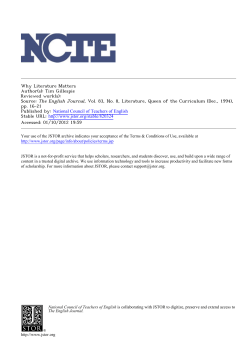
Bob Hicok Two living wills The father has a box. And in this box is a
Bob Hicok Two living wills The fatherhas a box. And in thisbox is a list ofall theboxes the fatherhas. What theircontentsare. What the name of each box is. Thereis The Box of FallingDown and The Box of MultipleUniverses. The listis in a language the fatherhopes to pass to the son. A language oflookingforthe error in the threadingof a bolt,ofkeepingthe standard and Phillipsscrewdriversfromhavingsex. The fatherhas writtenat thebottomof thelist, "One day you will be readingthesewords,whichare, One dayyou willbe readingthesewords, and a listof everything will revealitselfto you as the redemptiveworkof a lifetime,and owning a box foreverything will help you trustthe afterlife can be assuredthroughritual,and you will find in each of theseboxes a piece ofwhatI feel, and fusethesepieces in yourmind,and I will exist." The mothersets cups on thelawn forrain or snow, whateverthe skyis saying.She goes about the house lookingmoonfuland placingthecups on the clock and the back ofthe couch. The mothertellsthe son to walk betweenthe circlesofthe cups and hold his face above each one and be judged bythewaters.At some point,themothers blood turnedto feathers,the mothersthoughts moved into her shoes, the mothers sex [530] This content downloaded from 128.192.114.136 on Fri, 20 Mar 2015 15:16:38 UTC All use subject to JSTOR Terms and Conditions BOB HICOK hung itselfon theline to be driedby thewind. The mothers letterto the son is writtenin his sleep. She leans to his ear and breathesthe smell of his listening.When thereis a choice to be made, the mothersays,make the feltchoice,the choice closestto the color blue, the choice most like thankingthe host afterthe meal, the choice thatradiatesbeyond thevisiblewavelengths. The motherremainsin the room long afternight has set offon its sled,her fingerstouching the cool edge of the sheet,her thoughtsmoving overthe son like thebeads of a rosary. This content downloaded from 128.192.114.136 on Fri, 20 Mar 2015 15:16:38 UTC All use subject to JSTOR Terms and Conditions 531
© Copyright 2025





















